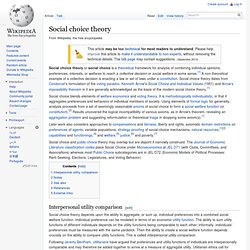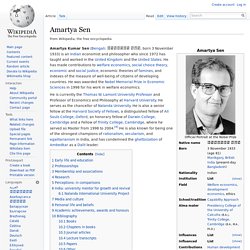

The World Economy. Open Knowledge Repository.
Report for Selected Countries and Subjects. Social choice theory. Social choice theory or social choice is a theoretical framework for analysis of combining individual opinions, preferences, interests, or welfares to reach a collective decision or social welfare in some sense.[1] A non-theoretical example of a collective decision is enacting a law or set of laws under a constitution.

Social choice theory dates from Condorcet's formulation of the voting paradox. Kenneth Arrow's Social Choice and Individual Values (1951) and Arrow's impossibility theorem in it are generally acknowledged as the basis of the modern social choice theory.[1] Social choice blends elements of welfare economics and voting theory. It is methodologically individualistic, in that it aggregates preferences and behaviors of individual members of society. Amartya Sen. Amartya Kumar Sen (Bengali: অমর্ত্য সেন; born 3 November 1933) is an Indian economist and philosopher who since 1972 has taught and worked in the United Kingdom and the United States.

He has made contributions to welfare economics, social choice theory, economic and social justice, economic theories of famines, and indexes of the measure of well-being of citizens of developing countries. He was awarded the Nobel Memorial Prize in Economic Sciences in 1998 for his work in welfare economics. He is currently the Thomas W. Lamont University Professor and Professor of Economics and Philosophy at Harvard University. He serves as the chancellor of Nalanda University. Singer–Prebisch thesis. The Singer–Prebisch thesis (also Prebisch–Singer thesis, PST, or Prebisch–Singer hypothesis) postulates that terms of trade, between primary products and manufactured goods, deteriorate in time.

In 1950, the economists Raúl Prebisch and Hans Singer independently developed the thesis that countries that export commodities (developing countries) in time would import fewer manufactured goods relative to a given level of exports. However, during the 2000s commodities boom, the terms of trade of most developing countries improved while east Asia (with much of its export to be manufactured goods) has deteriorated terms of trade.[1]
Trade And Poverty 1234.